外研版英语七年级上册 Module 4 Healthy food Unit 1 We've got lots of apples课件(共44张PPT)
文档属性
| 名称 | 外研版英语七年级上册 Module 4 Healthy food Unit 1 We've got lots of apples课件(共44张PPT) |
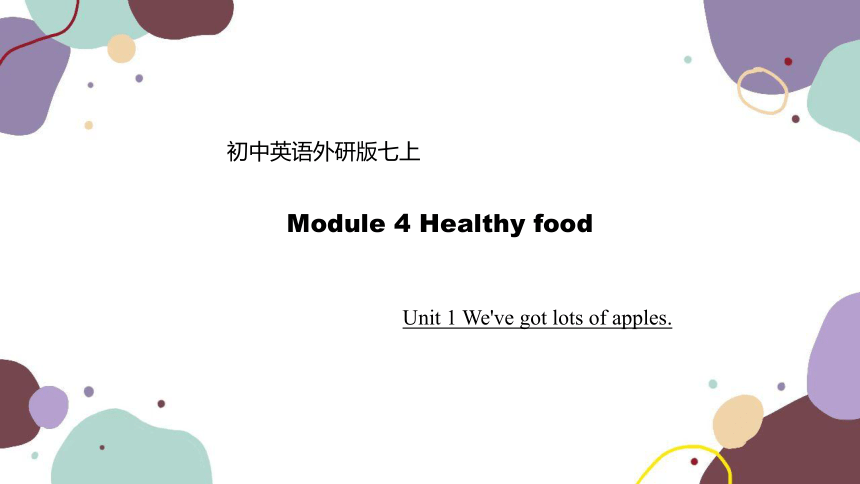
|
|
| 格式 | pptx | ||
| 文件大小 | 4.2MB | ||
| 资源类型 | 教案 | ||
| 版本资源 | 外研版 | ||
| 科目 | 英语 | ||
| 更新时间 | 2023-06-06 08:08:55 | ||
图片预览

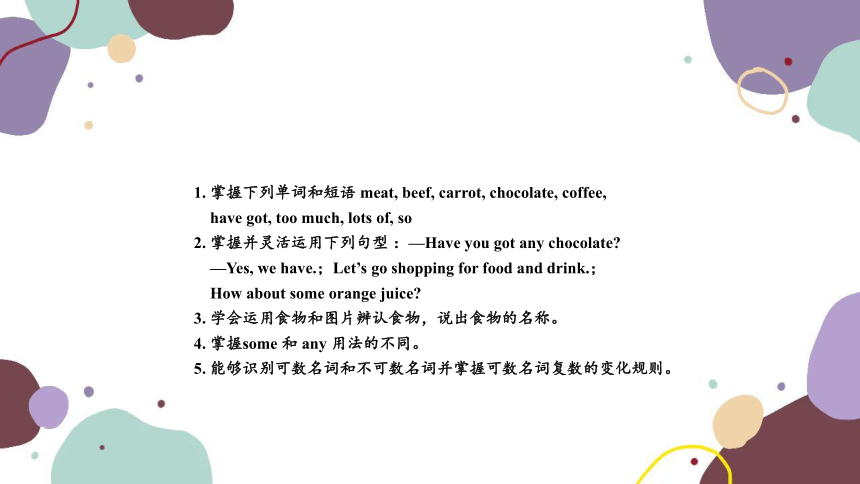
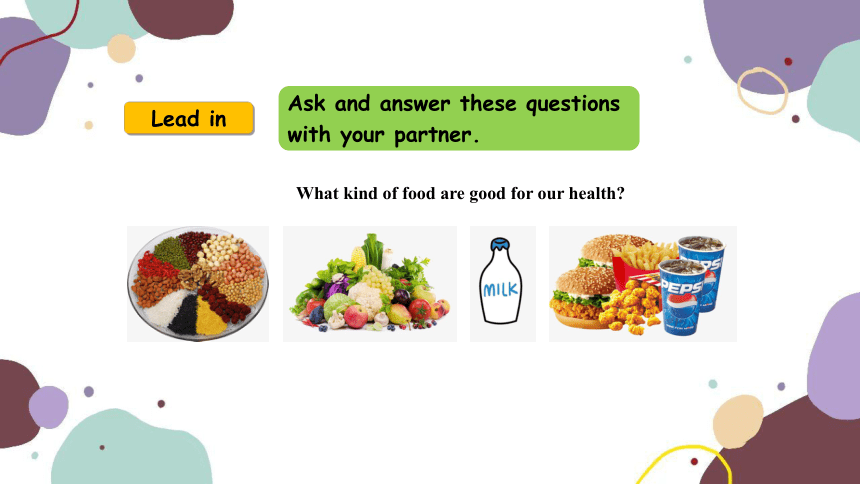
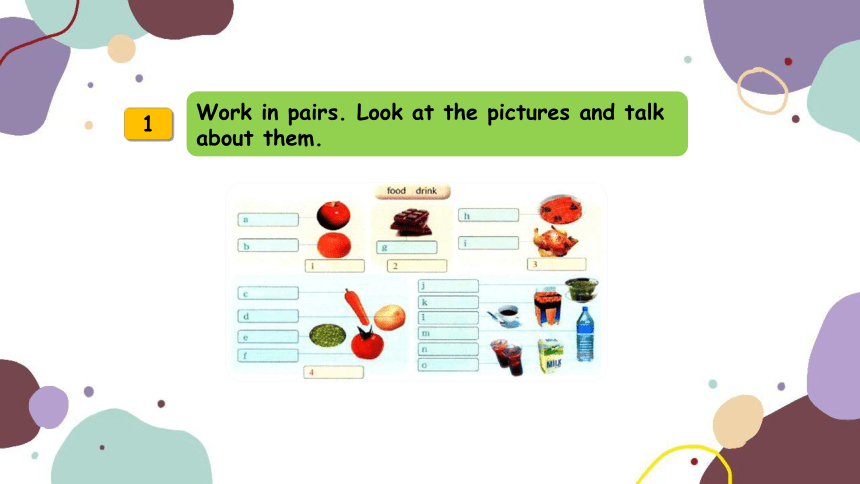
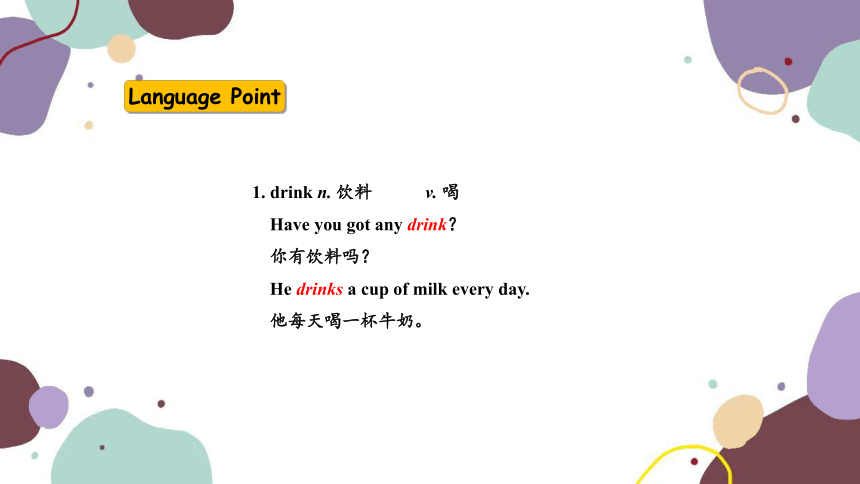
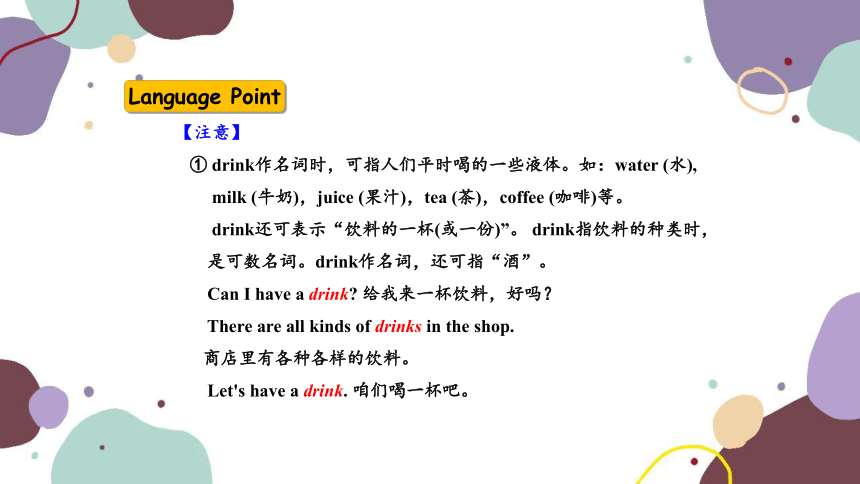
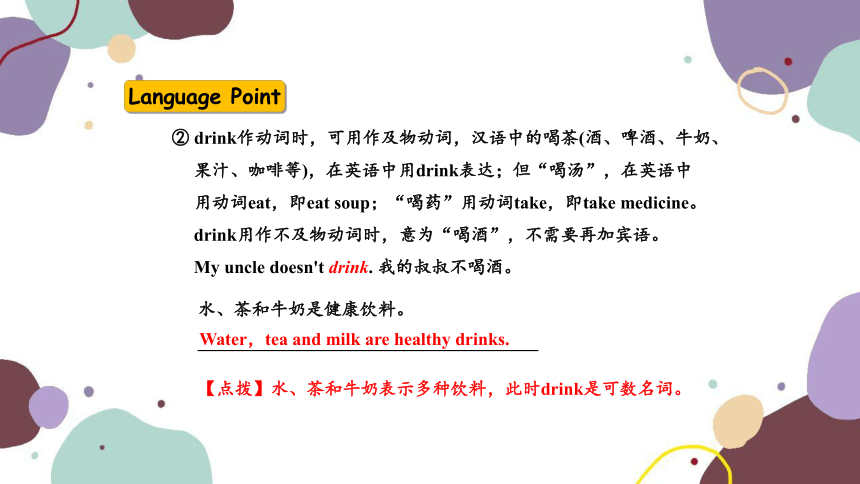
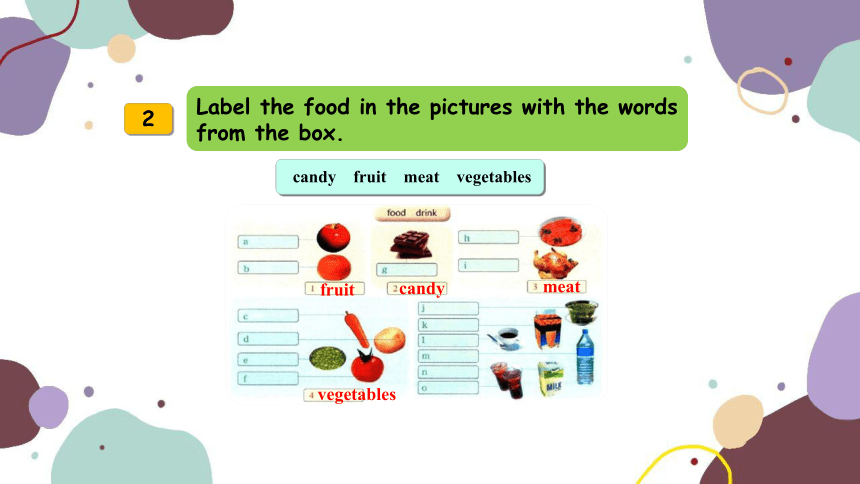
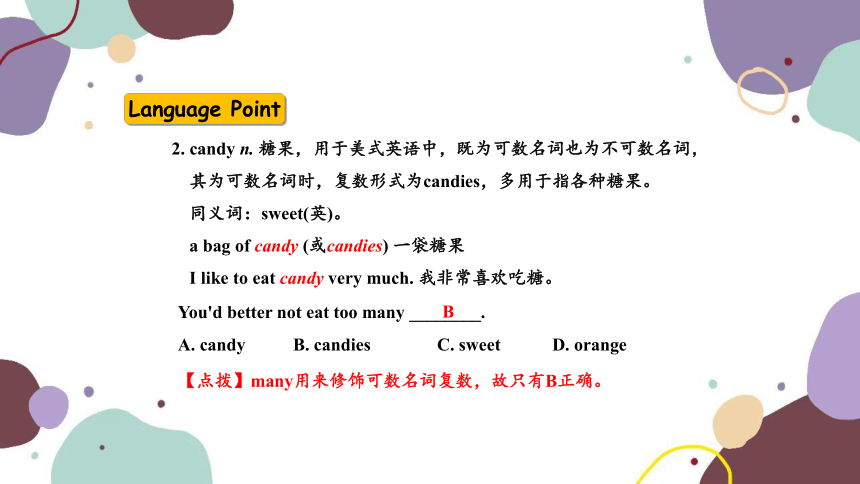
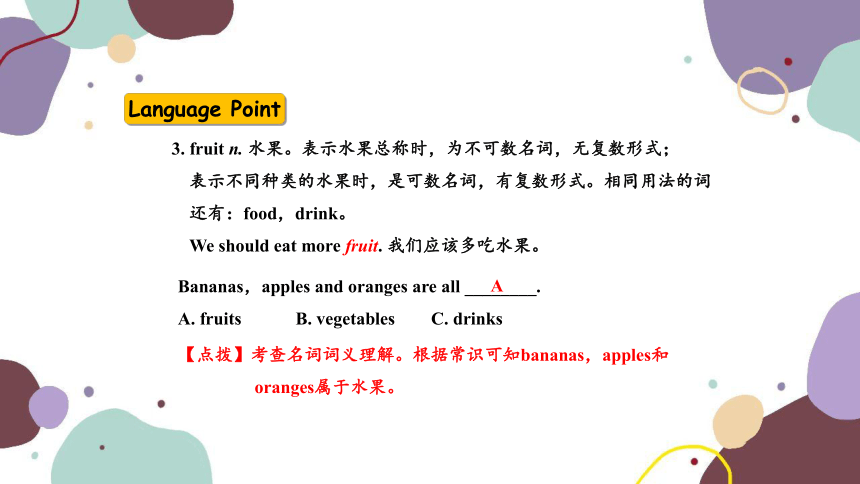
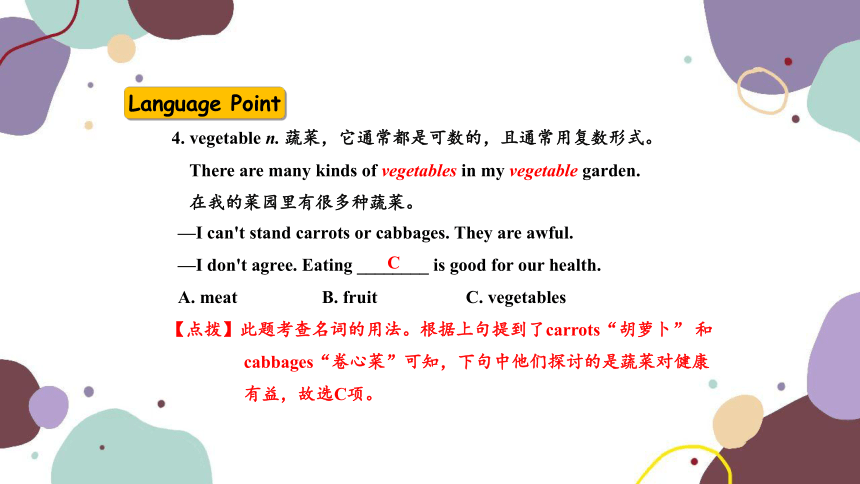
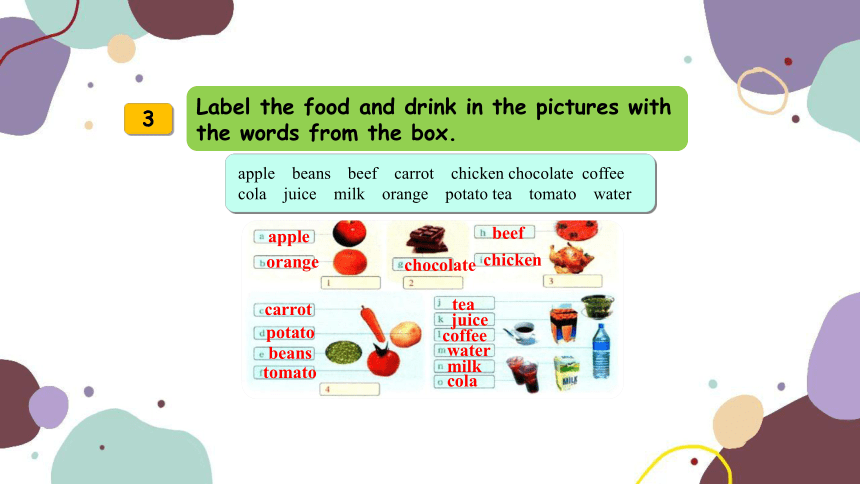
文档简介
(共44张PPT)
Module 4 Healthy food
初中英语外研版七上
Unit 1 We've got lots of apples.
1. 掌握下列单词和短语 meat, beef, carrot, chocolate, coffee,
have got, too much, lots of, so
2. 掌握并灵活运用下列句型 :—Have you got any chocolate
—Yes, we have.;Let’s go shopping for food and drink.;
How about some orange juice
3. 学会运用食物和图片辨认食物,说出食物的名称。
4. 掌握some 和 any 用法的不同。
5. 能够识别可数名词和不可数名词并掌握可数名词复数的变化规则。
Lead in
Ask and answer these questions
with your partner.
What kind of food are good for our health
1
Work in pairs. Look at the pictures and talk about them.
Language Point
1. drink n. 饮料 v. 喝
Have you got any drink?
你有饮料吗?
He drinks a cup of milk every day.
他每天喝一杯牛奶。
Language Point
【注意】
① drink作名词时,可指人们平时喝的一些液体。如:water (水),
milk (牛奶),juice (果汁),tea (茶),coffee (咖啡)等。
drink还可表示“饮料的一杯(或一份)”。 drink指饮料的种类时,
是可数名词。drink作名词,还可指“酒”。
Can I have a drink 给我来一杯饮料,好吗?
There are all kinds of drinks in the shop.
商店里有各种各样的饮料。
Let's have a drink. 咱们喝一杯吧。
Language Point
② drink作动词时,可用作及物动词,汉语中的喝茶(酒、啤酒、牛奶、
果汁、咖啡等),在英语中用drink表达;但“喝汤”,在英语中
用动词eat,即eat soup;“喝药”用动词take,即take medicine。
drink用作不及物动词时,意为“喝酒”,不需要再加宾语。
My uncle doesn't drink. 我的叔叔不喝酒。
水、茶和牛奶是健康饮料。
______________________________________
Water,tea and milk are healthy drinks.
【点拨】水、茶和牛奶表示多种饮料,此时drink是可数名词。
2
Label the food in the pictures with the words from the box.
candy fruit meat vegetables
fruit
candy
meat
vegetables
Language Point
2. candy n. 糖果,用于美式英语中,既为可数名词也为不可数名词,
其为可数名词时,复数形式为candies,多用于指各种糖果。
同义词:sweet(英)。
a bag of candy (或candies) 一袋糖果
I like to eat candy very much. 我非常喜欢吃糖。
You'd better not eat too many ________.
A. candy B. candies C. sweet D. orange
B
【点拨】many用来修饰可数名词复数,故只有B正确。
Language Point
3. fruit n. 水果。表示水果总称时,为不可数名词,无复数形式;
表示不同种类的水果时,是可数名词,有复数形式。相同用法的词还有:food,drink。
We should eat more fruit. 我们应该多吃水果。
Bananas,apples and oranges are all ________.
A. fruits B. vegetables C. drinks
A
【点拨】考查名词词义理解。根据常识可知bananas,apples和
oranges属于水果。
Language Point
4. vegetable n. 蔬菜,它通常都是可数的,且通常用复数形式。
There are many kinds of vegetables in my vegetable garden.
在我的菜园里有很多种蔬菜。
—I can't stand carrots or cabbages. They are awful.
—I don't agree. Eating ________ is good for our health.
A. meat B. fruit C. vegetables
C
【点拨】此题考查名词的用法。根据上句提到了carrots“胡萝卜” 和
cabbages“卷心菜”可知,下句中他们探讨的是蔬菜对健康
有益,故选C项。
3
Label the food and drink in the pictures with the words from the box.
apple beans beef carrot chicken chocolate coffee
cola juice milk orange potato tea tomato water
apple
orange
potato
chicken
tea
carrot
beans
tomato
beef
chocolate
juice
coffee
water
milk
cola
Language Point
5. chicken n. 鸡肉。chicken“鸡肉”,不是个体名词,而是物质
名词,是不可数名词,没有复数形式。某些表示动物名称的词,
用来指这类动物的肉时,就由个体名词变为物质名词。
I have some chicken for lunch. 午饭我吃一些鸡肉。
They keep chickens on the farm. 他们在农场养鸡。
Would you like some ________(鸡肉)
chicken
【点拨】chicken还可作名词,意为“鸡,小鸡”,是可数名词。
Language Point
6. juice为名词,意为“果汁,菜汁,肉汁”。一般用作不可数名词,
但表示不同种类的果汁时,用作可数名词。
Please give him a glass of juice. 请给他一杯果汁。
juice前面可以加水果、蔬菜的名称作定语,表示果汁的口味及性质。
I don't like pear juice. 我不喜欢梨汁。
—Would you please pass(递给) me something to drink
—What about some ________
A. beef B. fish C. juice D. bread
C
【点拨】根据上句句意“请递点喝的东西给我,好吗?”可知,
要选能够喝的,四个选项中只有juice是能够喝的。故选C。
Language Point
7. potato土豆,是可数名词,变复数在其后加 es,即potatoes。英语
中以o结尾的名词变复数时,有些加 es,有些加 s。本课学的potato和tomato加 es。但photo,radio,zoo等直接加 s。
American people eat a lot of potatoes. 美国人吃许多土豆。
【口诀】 o结尾的名词变复数
目前所学单词只有hero,tomato和potato四个单词加 es构成复数。可记忆为:英雄爱吃西红柿和马铃薯。
Language Point
How many ________ are there in the basket?
A. potato B. bread C. tomatoes
C
【点拨】此题用题眼法解答。根据题眼are可知,
主语为复数形式,故选C项。
4
Listen and check(√) the food and drink Betty and her mother have got.
apples juice
beans milk
beef oranges
carrots potatoes
chicken tea
coffee tomatoes
cola water
Learning to learn
Remember! Write words you learn in groups.
fruit:apple orange
meat:beef chicken fish
√
√
√
√
√
√
听力材料
Betty’s mum: Betty, please help me make a shopping list.
Betty: Yes, Mum.
Betty’s mum: What have we got
Betty: We’ve got some chicken... apples and oranges.
Betty’s mum: And we’ve got some tea, tomatoes... and coffee.
Betty: But we haven’t got any cola... beans... beef, carrots, juice and
milk.
Betty’s mum: And we haven’t got any potatoes and any water.
5
Listen and read.
Tony’s dad: Tony, let's go shopping for food and drink. Now,
we haven't got any meat. Let's get some chicken.
Tony: OK. Have we got any chocolate
Tony's dad: Yes,we have. Too much chocolate isn't good for you.
Let's get some fruit.
Tony: What kind of fruit Apples
Tony's dad: No,we've got lots of apples. We haven't got any oranges,so let's get some.
Tony: OK. How about some orange juice?
Tony's dad: Yes,good idea! And coffee. Let's get some for your mum. She hasn't got
any coffee.
Tony: All right,some coffee for Mum,and some cola for me. I haven't got any cola.
Tony's dad: No cola! Cola is bad for you! How about some tea
Tony: Oh,too bad!
Everyday English
Let's go shopping for...
How about...
Good idea!
5
Now complete the table.
Things Tony's family has got at home Things Tony's family hasn't got at home
Food
Drink
meat,chicken,oranges
chocolate,apples
orange juice,coffee,
cola,tea
Language Point
8. shop v. 逛商店;购物.为不及物动词,所以与宾语连用时,需加
介词for,相当于buy。
She always shops in that store. 她总是在那个商店购物。
She wants to shop for some new clothes. 她想去购买一些新衣服。
shop n. 商店;店铺,近义词是store。
We often buy bread at this shop. 我们经常在这个商店买面包。
固定搭配:shop for things买东西;go shopping去购物
do some shopping买一些东西
我要去买一些食物。
I want to ________ ________ ________ some food.
go shopping for
Language Point
9. Let's do sth. 咱们做某事吧。这个句型可用于邀请或建议某人和
说话人一起去做某事。
Let's go shopping for food and drink. 咱们去买食物和饮料吧。
Let's go home. 咱们回家吧。
【辨析】let's和let us
(1) Let's do sth.提出建议,劝说对方一同做某事。
Let's go out for a walk. 咱们出去散步吧。(包括对方)
(2) Let us do sth.让(或允许)我们做某事,即向对方提出请求,
对方并不参与。
Let us have a rest. (你)让我们休息一下。(不包括对方)
Language Point
10. let“让”为使役动词,后跟名词或人称代词宾格,后面必须用
省略to的不定式作宾语补足语。let sb. do sth.“让某人做某事”,
表示说话人的建议,注意let后的sb.,除了us外,其他代词宾格
都不能与let缩写。
Let me help you. 让我来帮助你。
Let's ________ for a walk,shall we
A. to go B. going C. go D. gone
C
【点拨】考查let sb. do sth.。即let's后要跟动词原形。
Language Point
11. get v. 得到
He usually gets a birthday cake on his birthday.
他通常在他生日那天得到一个生日蛋糕。
get v. 买
I want to get a new coat. 我想买件新大衣。
get v. 变得
The day gets longer in spring. 在春天白天变得更长。
get v. 弄来,取来
Get me a cup of tea. 给我拿杯茶。
Language Point
Please get some apples for me when you go shopping. ( )
A. buy B. give
C. bring D. receive
A
【点拨】题意是“当你去购物时,请你给我买些苹果。”
此处get 意为“买”,与buy 同义。
Language Point
12. some det. 一些,既可修饰可数名词复数,也可修饰不可数名词;
还可以作代词,代替可数名词的复数形式或不可数名词。
There are some books on the desk. 书桌上有些书。
I want some apples, but my brother wants some water.
我想要些苹果,但我弟弟想要些水。(作限定词修饰名词)
The oranges are nice. I want some.
这些橘子很好吃。我想要一些。(作代词)
Language Point
【辨析】some和any
some 用于肯定句中或用于表示邀请、请求或希望得到肯定回答的疑问句中 Would you like some milk
你想喝点牛奶吗?
any 多用于疑问句、否定句中 There aren't any pens in the box.
盒子里没有钢笔了。
当any表示“任何”的意思,起强调作用时,
它可以用在肯定句中。
Any student can answer this question.
任何学生都可以回答这个问题。
Language Point
—Are there ________ maps in your class
—Yes,there are ________.
A. any; some B. some; some C. some; any D. any; any
A
【点拨】作“一些”讲时,some一般用于肯定句,any一般用于
否定句和疑问句。此题的上句为一般疑问句,故应用
any,下句为肯定句,故应用some,故选A项。
Language Point
13. 【辨析】too much,too many和much too
too much 太多,中心词是“much”,后面跟不可数名词, too是用来加强much的语气的。 I have too much home work.
我有太多作业。
too many 太多,用法与many相同,用来修饰可数名词复数。 He's got too many quest ions.
他有太多问题。
much too 太……,一般后面加形容词、副词,much too的中心词是“too”, much是用来加强too的语气的。 You are driving much too fast.
你开车太快了。
Language Point
—The meat is ________ delicious.
—Yes,but don't eat ________.
A. too much;too much B. much too;too much
C. too much;much too D. much too;much too
B
【点拨】此题用题眼法解答。too much“太多”,修饰不可数名词;
much too“太,非常”,修饰形容词或副词原级。根据
delicious可知要用much too来修饰,意为“非常美味”,
第二空根据句意可知是表达“别吃得太多”。故选B。
Language Point
14. be good后接不同的介词,表达的意思也不同。
① be good at 意为“擅长……”,后接名词、代词或动词的 ing形式。
I'm good at playing chess. 我擅长下国际象棋。
② be good with意为“灵巧的;善于应付……的”。
She is good with her hands. 她手很巧。
He is very good with children. 他对孩子很有一套。
③ be good to意为“对……友好”。
My friend was very good to me when I was ill.
我生病时我的朋友对我关怀备至。
Language Point
④ be good for意为 “对……有好处”。其反义短语为be bad for。
Eating more vegetables is good for your health.
多吃蔬菜对你的健康有好处。
Practicing in groups (分组练习) is good ________
us to learn English.
A. at B. in C. for
C
【点拨】句意:分组练习对我们学习英语有好处。be good for意为
“对……有好处”,故选C。
Language Point
15. lots of 大量;许多=a lot of,后接可数名词复数,相当于many;
后接不可数名词,相当于much。
I have got lots of/a lot of/many books.
我有很多书。
There is lots of/a lot of/much food in the fridge.
冰箱里有许多食物。
lots of与a lot of多用于肯定句,在否定句和疑问句中多用many或much。
Language Point
His father has ________ money and he can ________
a new car.
A. lots of;buy B. a lot;buy
C. many;buy D. much;buying
A
【点拨】句意为“他的父亲很有钱,他能买辆新的小汽车。”
can后跟动词原形,故排除D;money为不可数名词,
lots of= a lot of,可以修饰可数名词复数和不可数名词。
故选A。
Language Point
a lot是口语中的一个常用词组,其主要用法有如下几点:
(1) 表示“很多;大量”,在句中作主语或宾语。
There is a lot to see at the party.
聚会上有许多可观赏的东西。(作主语)
You know a lot/much about English names.
你知道许多有关英语姓名的情况。(作宾语)
Language Point
(2) 作副词短语,在句中表示程度,表示“很;非常”,修饰动词、
感叹词等。
It usually rains a lot/much at this time of the year.
每年这个时候通常会下很多雨。(修饰动词rains)
Thanks a lot/very much.
多谢。(修饰感叹词thanks)
6
Talk about Tony's shopping.
—Has he got any chicken
—No,he hasn't.
7
Listen and repeat.
/s/ drinks
/z/ apples potatoes vegetables
/t/ tea tomato water
/d/ bad food idea
8
Listen and choose /s/ or /z/.
1 apples 2 beans 3 drinks 4 potatoes
/z/
/z/
/z/
/s/
9
Work in pairs. Make a shopping list.
Student A: Make a list of things you need.
Student B: Make a list of things you've got.
Now ask and answer.
-Have we got any...
-Yes,we have. We've got some .../No,we haven't.
课堂小结
重点单词: food, drink, candy, fruit, meat, vegetable, apple, chicken, chocolate, coffee, juice, milk, potato tea, tomato, water, go shopping, has got, some, lots of, so, bad
重点句式:We’ve got some…; —Have we got any… —Yes, we have./No ,we haven’t.;
学会谈论购买实物。
1. 熟记本课时的词汇
2. 熟读教材P20中4,5的内容
3. 完成本课时的课后作业
Homework
Eat well, drink in moderation, and sleep sound, in these three good health abound.
吃得好,喝得节制,睡得安稳,乃健康之道。
Exercise, temperance; fresh air, and needful rest are the best of all physicians.
运动、节制、新鲜空气和必要的休息是最好的医生。
Remember
Thanks for listening!
Module 4 Healthy food
初中英语外研版七上
Unit 1 We've got lots of apples.
1. 掌握下列单词和短语 meat, beef, carrot, chocolate, coffee,
have got, too much, lots of, so
2. 掌握并灵活运用下列句型 :—Have you got any chocolate
—Yes, we have.;Let’s go shopping for food and drink.;
How about some orange juice
3. 学会运用食物和图片辨认食物,说出食物的名称。
4. 掌握some 和 any 用法的不同。
5. 能够识别可数名词和不可数名词并掌握可数名词复数的变化规则。
Lead in
Ask and answer these questions
with your partner.
What kind of food are good for our health
1
Work in pairs. Look at the pictures and talk about them.
Language Point
1. drink n. 饮料 v. 喝
Have you got any drink?
你有饮料吗?
He drinks a cup of milk every day.
他每天喝一杯牛奶。
Language Point
【注意】
① drink作名词时,可指人们平时喝的一些液体。如:water (水),
milk (牛奶),juice (果汁),tea (茶),coffee (咖啡)等。
drink还可表示“饮料的一杯(或一份)”。 drink指饮料的种类时,
是可数名词。drink作名词,还可指“酒”。
Can I have a drink 给我来一杯饮料,好吗?
There are all kinds of drinks in the shop.
商店里有各种各样的饮料。
Let's have a drink. 咱们喝一杯吧。
Language Point
② drink作动词时,可用作及物动词,汉语中的喝茶(酒、啤酒、牛奶、
果汁、咖啡等),在英语中用drink表达;但“喝汤”,在英语中
用动词eat,即eat soup;“喝药”用动词take,即take medicine。
drink用作不及物动词时,意为“喝酒”,不需要再加宾语。
My uncle doesn't drink. 我的叔叔不喝酒。
水、茶和牛奶是健康饮料。
______________________________________
Water,tea and milk are healthy drinks.
【点拨】水、茶和牛奶表示多种饮料,此时drink是可数名词。
2
Label the food in the pictures with the words from the box.
candy fruit meat vegetables
fruit
candy
meat
vegetables
Language Point
2. candy n. 糖果,用于美式英语中,既为可数名词也为不可数名词,
其为可数名词时,复数形式为candies,多用于指各种糖果。
同义词:sweet(英)。
a bag of candy (或candies) 一袋糖果
I like to eat candy very much. 我非常喜欢吃糖。
You'd better not eat too many ________.
A. candy B. candies C. sweet D. orange
B
【点拨】many用来修饰可数名词复数,故只有B正确。
Language Point
3. fruit n. 水果。表示水果总称时,为不可数名词,无复数形式;
表示不同种类的水果时,是可数名词,有复数形式。相同用法的词还有:food,drink。
We should eat more fruit. 我们应该多吃水果。
Bananas,apples and oranges are all ________.
A. fruits B. vegetables C. drinks
A
【点拨】考查名词词义理解。根据常识可知bananas,apples和
oranges属于水果。
Language Point
4. vegetable n. 蔬菜,它通常都是可数的,且通常用复数形式。
There are many kinds of vegetables in my vegetable garden.
在我的菜园里有很多种蔬菜。
—I can't stand carrots or cabbages. They are awful.
—I don't agree. Eating ________ is good for our health.
A. meat B. fruit C. vegetables
C
【点拨】此题考查名词的用法。根据上句提到了carrots“胡萝卜” 和
cabbages“卷心菜”可知,下句中他们探讨的是蔬菜对健康
有益,故选C项。
3
Label the food and drink in the pictures with the words from the box.
apple beans beef carrot chicken chocolate coffee
cola juice milk orange potato tea tomato water
apple
orange
potato
chicken
tea
carrot
beans
tomato
beef
chocolate
juice
coffee
water
milk
cola
Language Point
5. chicken n. 鸡肉。chicken“鸡肉”,不是个体名词,而是物质
名词,是不可数名词,没有复数形式。某些表示动物名称的词,
用来指这类动物的肉时,就由个体名词变为物质名词。
I have some chicken for lunch. 午饭我吃一些鸡肉。
They keep chickens on the farm. 他们在农场养鸡。
Would you like some ________(鸡肉)
chicken
【点拨】chicken还可作名词,意为“鸡,小鸡”,是可数名词。
Language Point
6. juice为名词,意为“果汁,菜汁,肉汁”。一般用作不可数名词,
但表示不同种类的果汁时,用作可数名词。
Please give him a glass of juice. 请给他一杯果汁。
juice前面可以加水果、蔬菜的名称作定语,表示果汁的口味及性质。
I don't like pear juice. 我不喜欢梨汁。
—Would you please pass(递给) me something to drink
—What about some ________
A. beef B. fish C. juice D. bread
C
【点拨】根据上句句意“请递点喝的东西给我,好吗?”可知,
要选能够喝的,四个选项中只有juice是能够喝的。故选C。
Language Point
7. potato土豆,是可数名词,变复数在其后加 es,即potatoes。英语
中以o结尾的名词变复数时,有些加 es,有些加 s。本课学的potato和tomato加 es。但photo,radio,zoo等直接加 s。
American people eat a lot of potatoes. 美国人吃许多土豆。
【口诀】 o结尾的名词变复数
目前所学单词只有hero,tomato和potato四个单词加 es构成复数。可记忆为:英雄爱吃西红柿和马铃薯。
Language Point
How many ________ are there in the basket?
A. potato B. bread C. tomatoes
C
【点拨】此题用题眼法解答。根据题眼are可知,
主语为复数形式,故选C项。
4
Listen and check(√) the food and drink Betty and her mother have got.
apples juice
beans milk
beef oranges
carrots potatoes
chicken tea
coffee tomatoes
cola water
Learning to learn
Remember! Write words you learn in groups.
fruit:apple orange
meat:beef chicken fish
√
√
√
√
√
√
听力材料
Betty’s mum: Betty, please help me make a shopping list.
Betty: Yes, Mum.
Betty’s mum: What have we got
Betty: We’ve got some chicken... apples and oranges.
Betty’s mum: And we’ve got some tea, tomatoes... and coffee.
Betty: But we haven’t got any cola... beans... beef, carrots, juice and
milk.
Betty’s mum: And we haven’t got any potatoes and any water.
5
Listen and read.
Tony’s dad: Tony, let's go shopping for food and drink. Now,
we haven't got any meat. Let's get some chicken.
Tony: OK. Have we got any chocolate
Tony's dad: Yes,we have. Too much chocolate isn't good for you.
Let's get some fruit.
Tony: What kind of fruit Apples
Tony's dad: No,we've got lots of apples. We haven't got any oranges,so let's get some.
Tony: OK. How about some orange juice?
Tony's dad: Yes,good idea! And coffee. Let's get some for your mum. She hasn't got
any coffee.
Tony: All right,some coffee for Mum,and some cola for me. I haven't got any cola.
Tony's dad: No cola! Cola is bad for you! How about some tea
Tony: Oh,too bad!
Everyday English
Let's go shopping for...
How about...
Good idea!
5
Now complete the table.
Things Tony's family has got at home Things Tony's family hasn't got at home
Food
Drink
meat,chicken,oranges
chocolate,apples
orange juice,coffee,
cola,tea
Language Point
8. shop v. 逛商店;购物.为不及物动词,所以与宾语连用时,需加
介词for,相当于buy。
She always shops in that store. 她总是在那个商店购物。
She wants to shop for some new clothes. 她想去购买一些新衣服。
shop n. 商店;店铺,近义词是store。
We often buy bread at this shop. 我们经常在这个商店买面包。
固定搭配:shop for things买东西;go shopping去购物
do some shopping买一些东西
我要去买一些食物。
I want to ________ ________ ________ some food.
go shopping for
Language Point
9. Let's do sth. 咱们做某事吧。这个句型可用于邀请或建议某人和
说话人一起去做某事。
Let's go shopping for food and drink. 咱们去买食物和饮料吧。
Let's go home. 咱们回家吧。
【辨析】let's和let us
(1) Let's do sth.提出建议,劝说对方一同做某事。
Let's go out for a walk. 咱们出去散步吧。(包括对方)
(2) Let us do sth.让(或允许)我们做某事,即向对方提出请求,
对方并不参与。
Let us have a rest. (你)让我们休息一下。(不包括对方)
Language Point
10. let“让”为使役动词,后跟名词或人称代词宾格,后面必须用
省略to的不定式作宾语补足语。let sb. do sth.“让某人做某事”,
表示说话人的建议,注意let后的sb.,除了us外,其他代词宾格
都不能与let缩写。
Let me help you. 让我来帮助你。
Let's ________ for a walk,shall we
A. to go B. going C. go D. gone
C
【点拨】考查let sb. do sth.。即let's后要跟动词原形。
Language Point
11. get v. 得到
He usually gets a birthday cake on his birthday.
他通常在他生日那天得到一个生日蛋糕。
get v. 买
I want to get a new coat. 我想买件新大衣。
get v. 变得
The day gets longer in spring. 在春天白天变得更长。
get v. 弄来,取来
Get me a cup of tea. 给我拿杯茶。
Language Point
Please get some apples for me when you go shopping. ( )
A. buy B. give
C. bring D. receive
A
【点拨】题意是“当你去购物时,请你给我买些苹果。”
此处get 意为“买”,与buy 同义。
Language Point
12. some det. 一些,既可修饰可数名词复数,也可修饰不可数名词;
还可以作代词,代替可数名词的复数形式或不可数名词。
There are some books on the desk. 书桌上有些书。
I want some apples, but my brother wants some water.
我想要些苹果,但我弟弟想要些水。(作限定词修饰名词)
The oranges are nice. I want some.
这些橘子很好吃。我想要一些。(作代词)
Language Point
【辨析】some和any
some 用于肯定句中或用于表示邀请、请求或希望得到肯定回答的疑问句中 Would you like some milk
你想喝点牛奶吗?
any 多用于疑问句、否定句中 There aren't any pens in the box.
盒子里没有钢笔了。
当any表示“任何”的意思,起强调作用时,
它可以用在肯定句中。
Any student can answer this question.
任何学生都可以回答这个问题。
Language Point
—Are there ________ maps in your class
—Yes,there are ________.
A. any; some B. some; some C. some; any D. any; any
A
【点拨】作“一些”讲时,some一般用于肯定句,any一般用于
否定句和疑问句。此题的上句为一般疑问句,故应用
any,下句为肯定句,故应用some,故选A项。
Language Point
13. 【辨析】too much,too many和much too
too much 太多,中心词是“much”,后面跟不可数名词, too是用来加强much的语气的。 I have too much home work.
我有太多作业。
too many 太多,用法与many相同,用来修饰可数名词复数。 He's got too many quest ions.
他有太多问题。
much too 太……,一般后面加形容词、副词,much too的中心词是“too”, much是用来加强too的语气的。 You are driving much too fast.
你开车太快了。
Language Point
—The meat is ________ delicious.
—Yes,but don't eat ________.
A. too much;too much B. much too;too much
C. too much;much too D. much too;much too
B
【点拨】此题用题眼法解答。too much“太多”,修饰不可数名词;
much too“太,非常”,修饰形容词或副词原级。根据
delicious可知要用much too来修饰,意为“非常美味”,
第二空根据句意可知是表达“别吃得太多”。故选B。
Language Point
14. be good后接不同的介词,表达的意思也不同。
① be good at 意为“擅长……”,后接名词、代词或动词的 ing形式。
I'm good at playing chess. 我擅长下国际象棋。
② be good with意为“灵巧的;善于应付……的”。
She is good with her hands. 她手很巧。
He is very good with children. 他对孩子很有一套。
③ be good to意为“对……友好”。
My friend was very good to me when I was ill.
我生病时我的朋友对我关怀备至。
Language Point
④ be good for意为 “对……有好处”。其反义短语为be bad for。
Eating more vegetables is good for your health.
多吃蔬菜对你的健康有好处。
Practicing in groups (分组练习) is good ________
us to learn English.
A. at B. in C. for
C
【点拨】句意:分组练习对我们学习英语有好处。be good for意为
“对……有好处”,故选C。
Language Point
15. lots of 大量;许多=a lot of,后接可数名词复数,相当于many;
后接不可数名词,相当于much。
I have got lots of/a lot of/many books.
我有很多书。
There is lots of/a lot of/much food in the fridge.
冰箱里有许多食物。
lots of与a lot of多用于肯定句,在否定句和疑问句中多用many或much。
Language Point
His father has ________ money and he can ________
a new car.
A. lots of;buy B. a lot;buy
C. many;buy D. much;buying
A
【点拨】句意为“他的父亲很有钱,他能买辆新的小汽车。”
can后跟动词原形,故排除D;money为不可数名词,
lots of= a lot of,可以修饰可数名词复数和不可数名词。
故选A。
Language Point
a lot是口语中的一个常用词组,其主要用法有如下几点:
(1) 表示“很多;大量”,在句中作主语或宾语。
There is a lot to see at the party.
聚会上有许多可观赏的东西。(作主语)
You know a lot/much about English names.
你知道许多有关英语姓名的情况。(作宾语)
Language Point
(2) 作副词短语,在句中表示程度,表示“很;非常”,修饰动词、
感叹词等。
It usually rains a lot/much at this time of the year.
每年这个时候通常会下很多雨。(修饰动词rains)
Thanks a lot/very much.
多谢。(修饰感叹词thanks)
6
Talk about Tony's shopping.
—Has he got any chicken
—No,he hasn't.
7
Listen and repeat.
/s/ drinks
/z/ apples potatoes vegetables
/t/ tea tomato water
/d/ bad food idea
8
Listen and choose /s/ or /z/.
1 apples 2 beans 3 drinks 4 potatoes
/z/
/z/
/z/
/s/
9
Work in pairs. Make a shopping list.
Student A: Make a list of things you need.
Student B: Make a list of things you've got.
Now ask and answer.
-Have we got any...
-Yes,we have. We've got some .../No,we haven't.
课堂小结
重点单词: food, drink, candy, fruit, meat, vegetable, apple, chicken, chocolate, coffee, juice, milk, potato tea, tomato, water, go shopping, has got, some, lots of, so, bad
重点句式:We’ve got some…; —Have we got any… —Yes, we have./No ,we haven’t.;
学会谈论购买实物。
1. 熟记本课时的词汇
2. 熟读教材P20中4,5的内容
3. 完成本课时的课后作业
Homework
Eat well, drink in moderation, and sleep sound, in these three good health abound.
吃得好,喝得节制,睡得安稳,乃健康之道。
Exercise, temperance; fresh air, and needful rest are the best of all physicians.
运动、节制、新鲜空气和必要的休息是最好的医生。
Remember
Thanks for listening!
同课章节目录
- Starte
- Module 1 My teacher and my friends
- Module 2 My English lesson
- Module 3 My English book
- Module 4 My everyday life
- Module 1 My classmates
- Unit 1 Nice to meet you.
- Unit 2 I'm Wang Lingling and I'm thirteen years ol
- Unit 3 Language in use.
- Module 2 My family
- Unit 1 Is this your mum?
- Unit 2 These are my parents.
- Unit 3 Language in use.
- Module 3 My school
- Unit 1 There are thirty students in my class.
- Unit 2 The library is on the left of the playgroun
- Unit 3 Language in use.
- Module 4 Healthy food
- Unit 1 We've got lots of apples.
- Unit 2 Is your food and drink healthy?
- Unit 3 Language in use.
- Module 5 My school day
- Unit 1 I love history.
- Unit 2 We start work at nine o'clock.
- Unit 3 Language in use.
- Revision module A
- Module 6 A trip to the zoo
- Unit 1 Does it eat meat?
- Unit 2 The tiger lives in Asia.
- Unit 3 Language in use.
- Module 7 Computers
- Unit 1 How do I write my homework on the computer?
- Unit 2 When do you use a computer?
- Unit 3 Language in use.
- Module 8 Choosing presents
- Unit 1 I always like birthday parties.
- Unit 2 She often goes to concerts.
- Unit 3 Language in use.
- Module 9 People and places
- Unit 1 We're enjoying the school trip a lot.
- Unit 2 They're waiting for buses or trains.
- Unit 3 Language in use.
- Module 10 Spring Festival
- Unit 1 Are you getting ready for Spring Festival?
- Unit 2 My mother's cleaning our houses and sweepin
- Unit 3 Language in use.
- Revision module B
